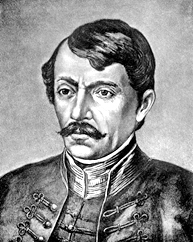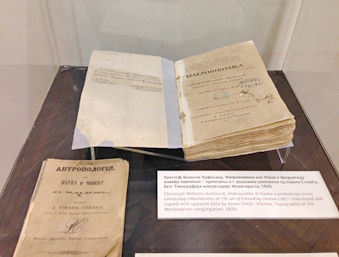|
||||||||||||||||||||||||||||||||||||
| [
Contents
] [ INDEX ]
|
||||||||||||||||||||||||||||||||||||
|
Page 58 |
||||||||||||||||||||||||||||||||||||
|
History of medicine Doctor Jovan Stejić – the first Serbian doctor of medicine Dijana Piljić (1), Jelena Horvat (2) |
||||||||||||||||||||||||||||||||||||
|
|
||||||||||||||||||||||||||||||||||||
| Download in pdf format | Summary: Doctor
Jovan Stejić was born in Arad on November 24, 1803. He was the first
Serbian to hold the title of Doctor of Medicine and worked in the
renewed Serbia. He was the creator of Serbian medical terminology,
the first Serbian anthropologist, and the Chief of Sanitation for
the Principality of Serbia. Additionally, he served as the Chief
Secretary of the State Council, a fighter for the reform of the
Serbian language and orthography, a great enlightener, and an
advocate for the rights of individuals and citizens. Doctor Stejić
was also one of the founders of the Society of Serbian Letters and
the Serbian Academy of Sciences and Arts. His arrival in Serbia as
the personal physician of Prince Miloš Obrenović marked the
beginning of organized healthcare services in the country. He
succeeded in bringing advanced medical ideas to Serbia, modeled
after the country where he studied. He belonged to the first
generation of Serbian intellectuals who invested their knowledge and
efforts into the cultural enlightenment of the Serbian people and
the building of the modern Serbian state in the 19th century. Some
of the key messages of his works include natural rights, the right
to freedom and equality, the right to honor and good name, and the
right to property and acquired goods. His stance was that the state
should be organized according to the law, and the law should be
equal for all. He spoke about freedom and people's right to express
their opinions. Significantly, he emphasized the educational role
for younger generations. As a pioneer in many areas, through his
literary work, he sought to highlight the foundations of moral
values and the importance of a clear and peaceful conscience,
thereby laying the foundations of medical ethics. One of his notable contributions was the book he translated and supplemented as a student according to the needs of the Serbian people, "Macrobiotics, or the Science of Prolonging Human Life," which was the first medical book in Serbia. By translating this book, he initiated pioneering work on Serbian medical terminology. Doctor Stejić died of tuberculosis in 1853 in Belgrade. He left behind his son, Pavle Stejić, a renowned Belgrade surgeon. Doctor Jovan Stejić distinguished himself through his diverse cultural, healthcare, and social work as a physician, writer, great scientist, and enlightener. Key words: Jovan Stejić, prvi srpski doktor medicine, prva srpska medicinska knjiga |
|||||||||||||||||||||||||||||||||||
|
INTRODUCTION Doctor Jovan Stejić, originally from Arad, was
the first Serbian Doctor of Medicine in the renewed Serbia during
the 19th century. He received his medical education in Pest and
Vienna. Coming from the Habsburg Monarchy, he arrived in the renewed
Serbia to serve as the personal physician of Prince Miloš Obrenović.
His arrival marked the beginning of organized healthcare services in
Serbia. BIOGRAPHY Doctor Jovan Stejić was born in Arad on November 24, 1803. He
completed his primary education in Arad, and after receiving a
scholarship from Sava Tekelija, he studied in Szeged, where he
finished his secondary education and began studying philosophy. Picture 1. Doctor Jovan Stejić
In that period, Serbia lacked qualified educational personnel, so
in 1828, Jevrem Obrenović awarded Jovan Stejić a scholarship. In
1829, Stejić began working in Šabac. From 1830 to 1832, he moved to
Kragujevac after Prince Miloš Obrenović appointed him as his
personal physician and tutor for his sons, Milan and Mihailo. Prince
Miloš highly valued Doctor Jovan both as a physician and as an
advisor. "Reflections on Diversity" Picture 2. Book: "Macrobiotics" by Doctor
Jovan Stejić
He often collaborated with the Glasnik of the DSS and served as
its editor-in-chief for a time. He also contributed to the
publications Dnevnik and Srpski narodni list. Among his published
works, the most notable is Makroviotika ili nauka o produženju
života čovekova (1826, Vienna). This is a Serbian-adapted
translation in the form of a textbook, an encyclopedic handbook of
the German clinician Johann Peter Huferland. In this work, hygiene
of sexual relations and the idea of blood transfusion were mentioned
for the first time in the Serbian language. CONCLUSION Dr. Jovan Stejić was a significant figure in Serbian culture and
medical history. He was considered one of the most respected
intellectuals in shaping Serbian culture, particularly its medical
history. He was a pioneer of preventive medical care in Serbian
territories and one of the founders of civil healthcare services.
Dr. Stejić was a physician, author of numerous articles and other
literary works, especially in medical and health education, a
translator, and a political and cultural activist. Dr. Stejić’s most
significant achievement is that he created Serbian medical
literature and medical terminology and founded the civil healthcare
system in Serbia.
|
||||||||||||||||||||||||||||||||||||
|
|
||||||||||||||||||||||||||||||||||||
| [
Contents
] [ INDEX ]
|
||||||||||||||||||||||||||||||||||||
|
||||||||||||||||||||||||||||||||||||


